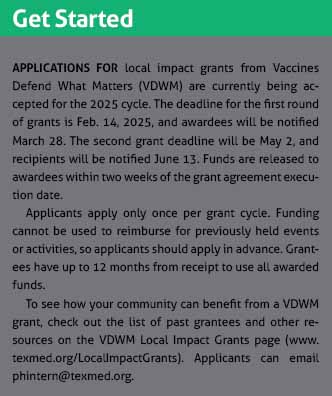
In the fall, a family physician’s thoughts naturally turn to flu vaccinations, but it can be tough to get patients to think along those same lines.
Many medical practices take the shots to where the patients are, such as community health fairs, school events, and homeless shelters. But doing that takes time and money, and that’s where grants offered by the Texas Medical Association’s Vaccines Defend What Matters (VDWM) initiative can help, says Austin internist Scott Clitheroe, MD, a member of TMA’s Board of Councilors.
Dr. Clitheroe is medical director at Hope Medical Clinic, which helps refugees, immigrants, and other medically underserved patients in the Austin area. Since 2021, the clinic has applied for and received an annual $3,500 VDWM grant that has paid for influenza vaccinations.
“There are just a lot of costs that go into a free clinic,” said Dr. Clitheroe, a former president of the Travis County Medical Society. “We’re able to utilize that grant purposely for the vaccinations, so it’s very important to us.”
TMA is a long-standing supporter of immunization efforts and has worked with the Texas Department of State Health Services and other recognized organizations to expand and promote vaccine resources.
Since 2012, TMA has offered grants to help county medical societies, TMA Alliance chapters, medical student chapters, and member-physician practices combat vaccine hesitancy and low vaccination rates in their communities (www.texmed.org/LocalImpactGrants).
Until 2019, TMA did this mostly through the Be Wise – Immunize program, which – like VDWM – was made possible by the TMA Foundation (TMAF). In 2020, TMA expanded that initiative by launching VDWM, an integrated multimedia public health education and advocacy program.
In the past three years, VDWM has awarded more than $195,000 to 63 programs in local impact grants, including vaccine education events at homeless shelters, free vaccine drives in low-income areas, and free medical exams and vaccinations for medically underserved patients, among others.
VDWM grants and the vaccines they pay for help Hope Medical Clinic’s physicians overcome some of the numerous barriers to delivering health care, Dr. Clitheroe says.
“You have the language barrier and transportation and, of course, financial [barriers],” he said.
Similar organizations throughout the state could benefit by taking advantage of the annual grants, Dr. Clitheroe says.
“It’s another method of getting funding for vaccinations, and it’s another way of making sure our patients have vaccinations,” he said. “And it’s another example of how TMA is a fantastic organization for all of us.”

Lessons learned
Like many TMA members, Tyler family physician Li-Yu Mitchell, MD, has used TMAF grants to help fund back-to-school immunization drives. In 2020, the Smith County Medical Society used that funding to provide before-school shot clinics with the Northeast Texas Public Health District.
“It was really beneficial because that served a need in our community, particularly for some kids who didn’t have primary care access,” she said.
VDWM grants also have allowed her to experiment with ways to reach different audiences. In one case, the experiments are more of a learning experience than a public health success.
In 2018, Dr. Mitchell worked with TMA’s Council on Science and Public Health to conduct a social media campaign promoting HPV vaccination for students at Tyler Junior College and The University of Texas at Tyler.
It found that while social media raised awareness about HPV, the campaign didn’t generate actual follow-through on getting vaccinated, she said.
“It was a good exercise in finding out how social media affects people’s compliance with HPV [vaccination], and it turned out that the answer was that it didn’t make an impact,” Dr. Mitchell said.
One barrier was that HPV vaccines were too expensive for health clinics to provide without knowing for sure that students would use them, she says. But the initiative also found that college students were more motivated to get the HPV shot because of word-of-mouth referrals or because they saw information that scared them about the health effects of HPV.
“People would go, ‘Ooh, I don’t want that,’” Dr. Mitchell said.
The grants can help cover a lot of costs, but physicians frequently partner with community organizations either to help share costs and responsibilities or to provide venues for shot clinics, says Lubbock internist Janice Stachowiak, MD, a member of TMA’s Council on Health Promotion.
For instance, the Lubbock County Medical Society and Alliance worked with the South Plains Food Bank to hold a drive-thru clinic this month to provide flu vaccines. People can drive through to first get their food and then receive a flu shot. That clinic – as well as three other efforts aimed at vaccinating low-income people in West Texas – provided vaccinations for nearly 70 in 2023.
Fortunately, the grant application process is easy, and TMA makes the process transparent, Dr. Stachowiak says.
“It would be difficult for us to do anything extra – like going to the food bank – without the grant,” she said.
A Galveston-area program had even more success, using a VDWM grant to administer 196 flu vaccines in 2023 – 60 more than the year before, according to The University of Texas Medical Branch Family Medicine Interest Group, which applied for the grant. The money also allowed the group to engage 48 medical students in the vaccination process, 28 more than the year before.
At Bryan’s Health For All clinic, the grants pay for Tdap vaccines that go primarily to low-income people who cannot afford health insurance, says Elizabeth Dickey, the clinic’s executive director. Health For All will need grants to expand its capacity in the near future.
“With the increasing number of furloughs, layoffs, and lost benefits [among people in the region], the clinic is in high demand,” she wrote to TMA.